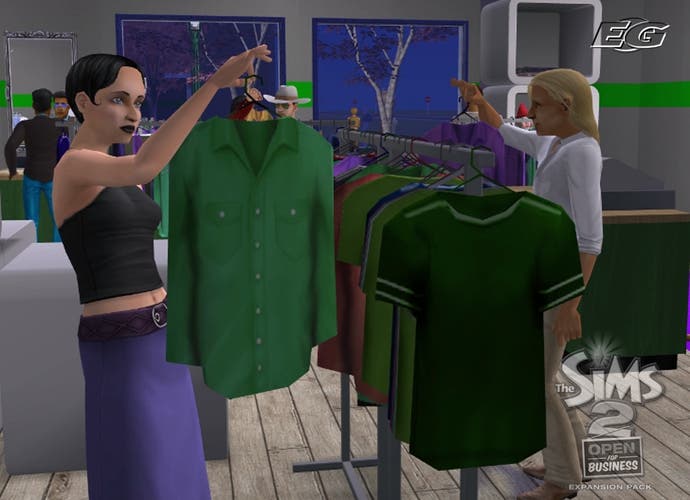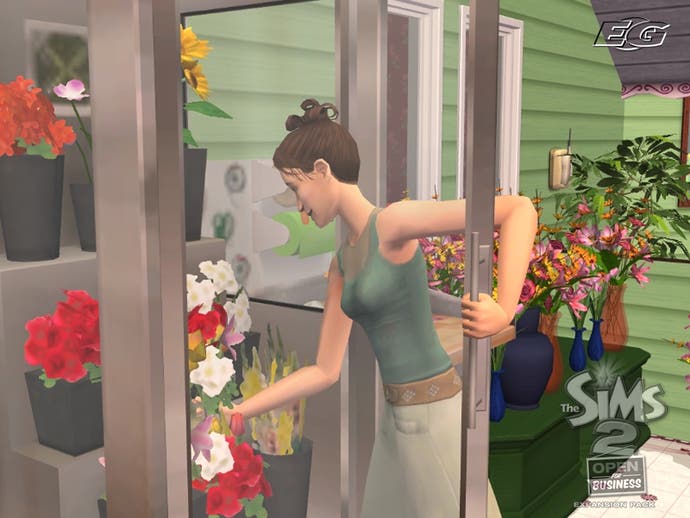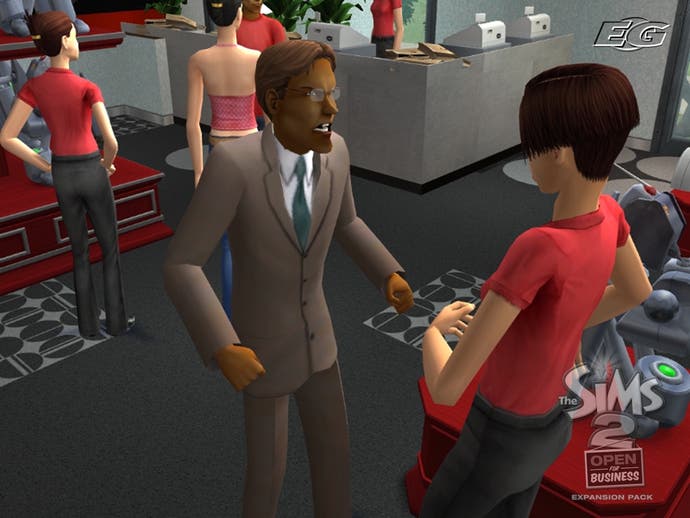The Sims 2 Open For Business
We see it first hand and chat to Maxis about the series as whole.
"One of our developers actually set up a shop selling stolen Xbox 360s," says Don Laabs, senior producer on Sims 2. He did what? "Well, he used the game device you can sell in-game." Oh, in the game.
Whenever people talk about The Sims, someone inevitably takes the view that it's a cynical operation designed to make EA lots and lots of money. With seven expansions for the original, console spin-offs, and the third Sims 2 expansion almost complete, it clearly does the money bit. But you don't pick up any of the other part from the developers - all they want to talk about is how awesome the conical roofing is, and show you what happens when you use the 'dazzle' sales technique. It's best summed up by how the other Maxis senior producer, Tim Letourneau puts it when I ask him about that air of cynicism: "Half of this pack is about making a bunch of toys that kids can play with... If we're just trying to sell, are we really going to invest time making sure that the in-game toddlers have more things to do?"
Open For Business, when it was announced, was pretty easy to take in: a tycoon-style graft onto the existing Sims base. But as with the other expansions there's a strong focus on new interactions, giving players more tools to diversify environments and give their sims more life and, in this instance, ways to create. "People loved the easel," says Letourneau; "the idea of their sims painting something and hanging it on the wall."
That's how it began, as an idea of giving sims more creative outlets, and then it grew into something else. "That's really how this happens - they morph. It's some kernel of an idea that players really seem to like, and it grows." What it grew into was a game about running a range of businesses, like an X360 knock-off shop, apparently. On a basic level there are three possible shop types - pay-per-item, pay-per-service, and pay-per-time - and from these you get florists, delis, art shops, spas, salons, toy shops, you name it, where the sims spend their time minding stock, buying from wholesale and building up their own inventory using the toy and robot-making stations, managing staff and so on.

But it's about having your sims experience these things, and you through them, rather than simply doing it all yourself. "It's not purely a god game in that respect," says Letourneau. To that end, there's real care and attention in the details. The devs loved showing me things like sims misbehaving. Hiring and firing is a key thing, obviously - you need to bring in the right people based on their skills, pay them accordingly and get your other sims to motivate them, and you also have to crack down on miscreants. One shop-hand, Andy, would leap into sales situations and try sales techniques he was awful at, putting customers off completely, and then reject what the other staff were saying. The final straw was when he jumped into a 'dazzle' - one of the top-ranking staffers had her hand on a customer's shoulder, painting a picture of joy in the air, when Andy waltzed in and started doing a ventriloquist routine with a teddy. Bosh. Fired. We hired some female customer to replace him, and she did better immediately.
It's things like this that makes The Sims so ideal for continuation, says Letourneau. "You start telling those stories in your head, so it's very easy for us to think of potential places to have The Sims go, and it's not about science fiction; it's not about 'The Sims Go To The Moon'; it's stuff that people can imagine for themselves.
"This is a game that's as much played in a player's head as it is on the screen," he says. "You're going to embellish and you're going to start telling stories. You're going to have projected outcomes based on your own personal experiences and that's where a lot of the humour comes from - there are these ironic twists that you just don't anticipate, like Robot Wars in the backyard [at one point in our demo, a robot went haywire and we employed another one to race around tidying up after it as it went doolally splashing water everywhere]. I didn't sit and think it'd be funny to do, but all of a sudden the humour in that comes out."

Maxis also wants what you do in business to benefit your sims at home. The most obvious benefit is financial, of course, but a successful business also ranks you up in five key areas - Connections, Perceptions, Cash, Wholesale and Motivation - each of which affects things in and out of the store. Connections, for example, mean that you can overcome the initial stumbling steps of home relationships with other sims through mutual recognition.
And of course you can dress up in a knight's helmet. Adding items to expansions is enough to tempt players into buying them anyway, according to Maxis. This one has 125 new objects and items. "There's that sort of collector mentality that goes along with it; taking away all of the gameplay and just thinking of it as a creativity tool," says Letourneau. "Every expansion pack, taking away the gameplay, has another value proposition which is that I'm going to get a bunch more stuff. It's kind of like saying to an artist, hey, here's 60 colours or 125 colours that you don't have already that you can add to your palette, and so it opens up that creativity that much more - that's what I mean by that collectible attribute." There's almost an ouroboros thing at work here - the pack started as crafts, became about selling them, and now your actions feed back into being able to afford the tools to create more things.
The range of new items is partly fun and partly functional - conical roofing, awnings and split-level flooring were things that fans wanted, as were elevators, and robots that tidy up after you just make sense. Water-wheels, jack-in-the-boxes, and robots going berserk are just there to entertain. It's fun watching how the sims react to their new toys and activities - particularly when you doll up some ordinary bloke in braids and face paint at the salon and he tips you extra.

At work, Maxis "certainly wanted it to feel like there was a business strategy and a win state," and so there are definitely ways to work up the business ladder and play it like a regular game. Talent badges, for instance, are earned through repetition of tasks. Earn a gold badge in making teddies, for example, and they'll cost less to do, but doing robots without badges will cost loads and take longer. These also affect things like your ability to do motivational speeches. A sim giving a decent pep talk to a colleague can up that sim to bronze level across the board for a limited time. You also get to fiddle with prices on a slider bar - gradually ramping up as your sims become better at selling stuff to punters. You can set automatic restocking from catalogue or your own inventory of manufactured goods, and there's customer loyalty to work out too, which comes about through various factors. As you apply sales techniques, you can watch the customer-sim's 'buy bar' go up and down.
Big success is also possible. You can even elevate staff to management positions after a while so you can go off and set up other stores. Equally, your business can eventually plunge into the red and fail if you clutter the aisles, piss off your clientele or, I dunno, sell pictures of Xbox 360s instead of real ones. But then maybe that'd work; it's the sort of quirky thing you wouldn't put past the Maxis guys. And on the strength of what's in Open For Business, you can't really see their line of work drying up soon either.
As to how many more of these expansions we can expect, that, appropriately enough, depends on the business. "I think that as long as there's interest in expansion packs, and that people are still willing to buy them, that with each one we earn the right to do the next," says Letourneau. Cynical? Or not? "I think for us, it's just fun to continue to add to this world."
The Sims 2 Open For Business is due out later this year. Read on for more of our discussion with Tim Letourneau about The Sims in general.


.png?width=291&height=164&fit=crop&quality=80&format=jpg&auto=webp)




.jpg?width=291&height=164&fit=crop&quality=80&format=jpg&auto=webp)
